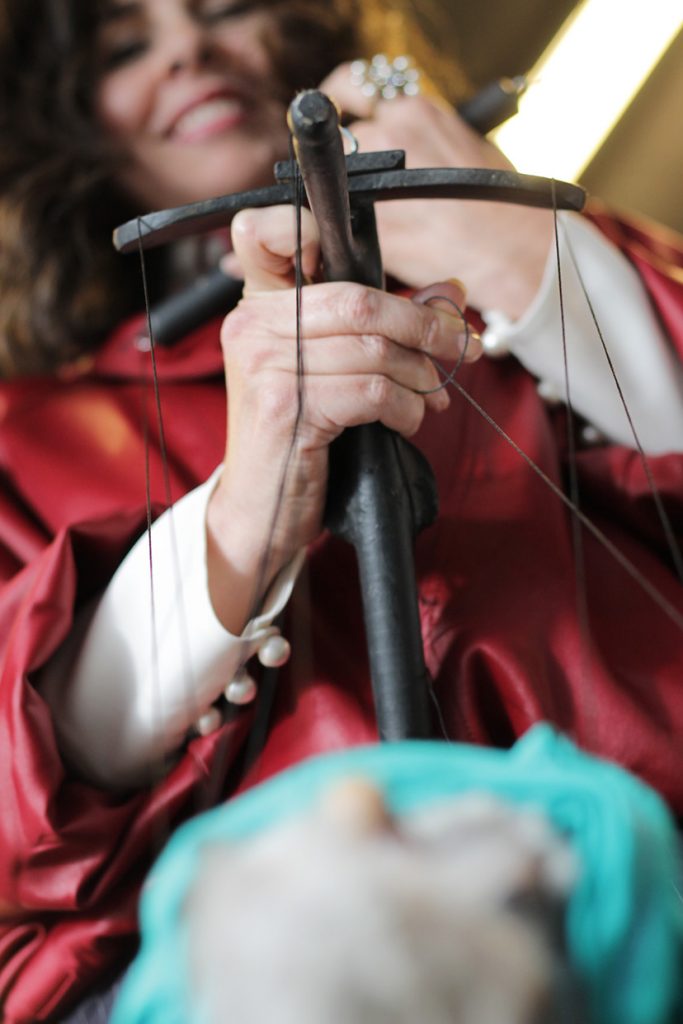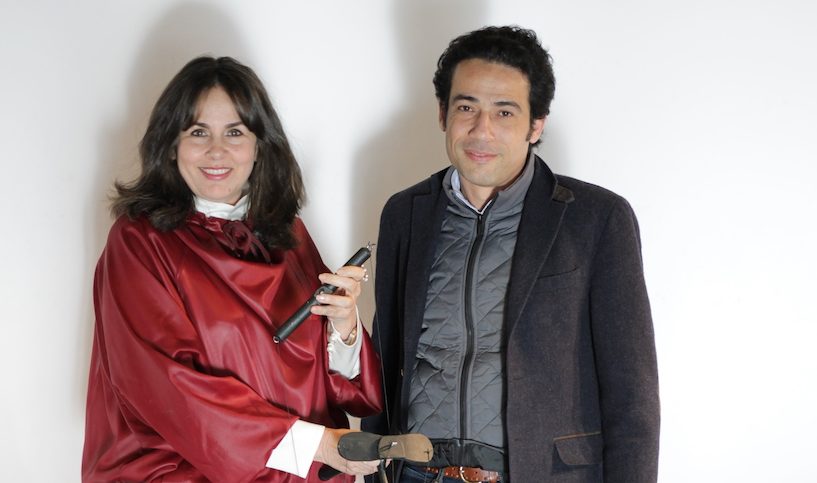Wamda, meaning “spark of light”, was founded by master puppeteer Nabil Bahgat over fifteen years ago, and the troupe has travelled extensively promoting the art of not only shadow puppetry, but also ‘Al Aragoz’. Before their regular Friday evening performances held in Bayt Al Suhaymi, an old Ottoman era house situated in one of Cairo’s oldest streets, Wamda provides workshops for children. This teaches them how to make the shadow puppets, hopefully passing on an interest to the youngest generation to develop skills that may otherwise be very easily forgotten in this day and age of gaming consoles and smart phone addiction.
“I’d seen one of these [Wamda] shows,” says Hooda Shawa, a storyteller herself and award-winning writer of children’s literature, going on to explain that she had then met Nabil as part of a cultural organization called Al Mawred. “It’s always been my dream to work on a shadow theatre show,” she says. Hooda goes on to describe the fourteenth century Mamluk era puppets on display in a Cairo museum that Nabil encouraged her to seek out. “And then by sheer coincidence Dr. Nabil was given the post of cultural attaché here!” smiles the Kuwaiti writer. Destiny was showing its hand, determined to have these two create something magical together. “Elephant in the City” was their first collaborative production in Kuwait and played on the TAQA stage, a production house initially founded to to provide a platform in Kuwait for performing arts and local theatre productions.
The tenacious duo is challenging themselves once again with the task of staging for shadow theatre “Julnar and the Firebird” another of Hooda’s children’s stories which has already been published in book form by Saqi Books, Beirut. The protagonist heroine is a princess, Julnar, who wishes to sail on ‘booms’, the great trading ships on their seafaring routes between Kuwait and East Africa, but being a princess and a female, her adventurous spirit is not encouraged! How does she find her way, and how do they resolve the predicament of Julnar’s pet Firebird’s alopecic tail-feathers on their quest. Nabil is bringing three of his troupe of seven Wamda artists to Kuwait specifically to work on the new production and has already started in the TAQA studio to plot out the staging requirements which will take months to plan, organize and build. Hooda also commissions original music to set the plays to, which is a large investment of time but helps to further promote the work of local creatives in Kuwait.

Interpreting someone else’s stories must be difficult and when asked what the challenges are Hooda confirms that Nabil usually writes his own stories or adapts traditional folklore tales updated to suit modern contemporary audiences. “I asked him to present the shows in classical Arabic, and his worry was that classical Arabic would be too formal”, “…and maybe not as funny for the kids,” Nabil adds. Hooda insisted though, and the result is a simplified version of the language so that anyone can understand it. “There is a phrase here and there in dialect,” she mentions, “to add a bit of color.” Given the audience feedback, the plays by all accounts are still wonderfully endearing with a range of emotions and humor too.
Nabil has brought with him some samples, and upon closer inspection of the puppet birds it is a revelation to see that the leather shapes are wildly colored with abandon. Holes are stamped strategically along the edges of the birds’ chests and wings, and it’s easy to see how light must play beautifully in and around these simple puppets. The artists draw, cut and craft the puppets that they work with. Working in this medium must be labor-intensive, as every puppeteer has to be the storyteller, actor, presenter and the lighting and stage designer too. “He’s called The Wizard [alsah’er], because he does everything” says Hooda respectfully of Nabil.

Eighteen years of incredibly hard work putting together a shadow theater dossier has recently resulted in Nabil successfully presenting to UNESCO the case for safeguarding the dying Egyptian artform, and having it placed on the Intangible Cultural Heritage list under the umbrella of Al Aragoz-an old form of Egyptian theatre using traditional hand puppetry, with the status ‘in need of urgent safeguarding’. This now means funding and a future for this highly skilled and creative method of storytelling. “Perhaps even the establishment of a school,” hopes Hooda earnestly. There are currently no institutions in Egypt where you can study the artform academically and how it is a way of maintaining oral tradition, passing down fables, and teaching communities. Only two other Egyptian contributions so far make the UNESCO Intangible Cultural Heritage list; an oral poem which recounts the saga of the Bani Hilal Bedouin tribe and its tenth century migration from the Arabian Peninsula to North Africa, and Tahteeb a former martial art turned stick game. Nabil’s contribution is truly historic.
“If I didn’t do this I would die,” says Nabil matter-of-factly when asked what got the 43-year-old Generation X’er into this magical ancient art. “It’s a recipe for heartbreak, you just go behind the screen and you are transported.” And it’s a passionate experience which one watches totally mesmerized, first looking at the movement, and then wondering, how does this magic happen. What is even more profound is that Nabil does not have any history of storytelling in his family. He’s the first, and has made a deep impact on the traditional artform, proving his point that it’s desperately important to safeguard this old form of Egyptian theatre using traditional hand puppetry practice, as UNESCO is now doing.
For more information on the performance dates of Julnar and the Firebird follow @taqakuwait on Instagram. Find Aragoz Wamda on Facebook and YouTube for more on Nabil Bahgat’s work.











